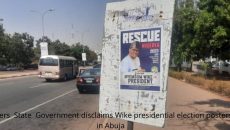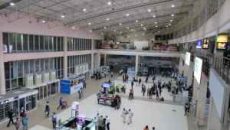Shola Salami Abdulrahman, Acting Director, Urban and Regional Planning, explains how more impetus has been given to the actualisation of the FCT master plan under Senator Bala Mohammed
By Anayochukwu Agbo and Nicholas Uwerunonye
So far, would you say that the Federal Capital Territory is conforming to the original master plan of the territory?
Your question is quite expected. The development in Abuja is all according to the master plan. If you have seen the master plan before you will see that it has many phases. You have the exterior roads, the apex of it, the Three Arms Zone; the spine of it, the Airport Road; they are all in position. They have all been realised. Once the new points are there, they are like the bones of the body, nothing is amiss. But people don’t understand that the master plan is just a document to guide for the building of the city. Just after that stage, because it is a micro document, there is the detailed structure plan, which we call the action plan. It is this process that people don’t understand. When we embark on them, people think that we have changed the master plan. The master plan itself is like the shadow human being. The structure plan is like the bones of the body. It is when you put on the flesh that it looks like the real person. This is why we have the action plan. This is where you see your houses where it is located, the churches, the school and the relationship among all these.
At what stage of the FCT master plan implementation are you now?
The master plan proposed three stages for the development of the city. The master plan envisaged that by 2001, we would have finished the three phases. And we would have achieved a 3.1 million population. But the influx of people and the demand for land has been amazing. It has gone beyond our initial projections. We are on phase five of the development plan. All those things you see on Airport Road are sitting on phase five lands. We are now struggling between challenges caused by development ahead of planning and the planning to meet the standards of planning itself, as put down by the founding fathers of the FCT. We are having sleepless nights to meet up with the expectations. Because of the rate of influx of people, the rate of development is geometric; we are constrained by the manpower and resources at hand. We need a lot of palliatives to meet up with the rate of challenges we are facing in terms of planning, logistics in terms of resources. This is where we are.
What are the milestones you have achieved so far?
From the planning process a lot of achievement has been recorded. We have moved the city forward in terms of planning. The phase one of the master plan is virtually completed; phase two actualised and phase three fully planned. Phase four north and phase four south are on course. In fact, phase four south is where you have the land swap project going on. In the past, there were rapid developments ahead of infrastructural provisions. This has caused a lot of deficit in the city. The Minster feels that it was time to correct these anomalies. That is why he initiated the site and services programme which is now termed as the Land Swap Initiative, where investors come they provide infrastructure and they get compensated with lands equal to the amount of money they invested.
Is your department prepared to handle the site and services, as it is new in the country?
Well it is really teamwork because the investors are the other side of the partnership. They have the funds. We on the part of government are socially inclined and particular about standards and plans. We must be ready to help meet up with the standard of the city. We also have to ensure that Nigerians benefit from this scheme irrespective of whatever class they belong. So we get involved in the design, the programming and in fact the execution. This is because we are the consultants and with the investors we work hand in hand to ensure that our standards are not compromised. In this plan, lots of attention was given to the villages and indigenes.
You talked about the phase four south and phase four north, what do these mean to laymen?
The phase four south is the southern sector of the FCT that leads to the southern end of the city. It terminates at Apo Road. That is the southern boundary of the city. The ONEX is the northern boundary of the city leading to Kaduna. The plan of Abuja is like the human form. The head is the Three Arms Zone where you have the Presidential Villa, the National Assembly, NASS, and the Supreme Court. The Central Area is like the ribs of the human body, while the boulevard is the spine, which runs straight to the airport to hit the A2 roads. You know the spinal cord connects the brain down to the cervix. That is what the Airport Road is. It divides the city into two. We have the northern and southern parts. The southern segment and tail to the north is where we have the land swap and the Centenary City Project, CCP. The northern parts take care of the phase four north, having the mass housing schemes and the industrial park. The park is also private sector driven. It is being executed as we speak. It has two parts in the design.
Has the CCP started?
We are currently doing the final review of the project and we have been in meetings.
What are the urban renewal projects that your department is handling?
Urban renewals cannot take place in the city. It takes place in the outside of the city confines. We don’t have urban renewal issues within the city. The only thing is that the villages in the city have to be relocated. This is because the master plan does not envisage villages within the city. This is because Abuja is set up based on world-class standards and there is no room for integration yet. So what we have now is that villages within the city have chosen where they prefer to be outside the city. We are planning the urban renewal with their participation and cooperation. This is done so that their social and cultural identity is not lost.
Are there policy reforms that the FCT minister has initiated in your department to help you and the people in these regards?
Yes. The FCT Minister has been proactive in this regard and carries everybody along. One area I found him to be outstanding is that there is a great deal of coordination. He creates opportunity for synergy amongst all various departments. He supports the departments too with funding. For instance, this department was on phase three when he came on board. During his tenure we have finished phase four north. We have almost completed phase five and phase four south is also done. So, planning work has not suffered at all under Senator Bala Mohammed. If not for inadequacy of funding we would have done an entire review of the regional development plan which was last done in 1983.
Now a lot of builders complain about non-clarity of procedure in getting approvals to build. So what exactly are the procedures in building a house in the FCT?
Thank you. To obtain a land in the FCT, you must be above 18. You must have an income, or be gainfully employed. The form is free. You can even print it out online. You can obtain the form; fill out your bio-data as usual. You will be required to fill where you feel you will need the land in the FCT. Then you pay N100,000 processing fee into the bank. This form is then taken to AGIS and it is then logged in. This is what you present upon which you are given an acknowledgement letter. Lands are allocated on first come first served basis, state by state. When it gets to your turn you will either get a text message or a publication showing your name. But people give up because they think nothing happens in Nigeria the normal way.
How is it like when it comes to building?
It depends on the kind of house you are building. For each type, like residential, commercial or recreational, there are approved standards. You cannot build whatever you like because the specifications are in the plan where your plot falls. To enforce this is the development control unit, which acts like the police ensuring that you comply with the plan.
Having spent several years in this department and the FCT, what would you say that Bala Mohammed will be remembered for?
I don’t want to be seen as a biased person. But I must be frank with you that the current Minister, even though I never got close to him until I became a director, has been a man I admire for so long and for many years because of his proactive nature in handling issues. He will be remembered for his open mindedness and has a cooperative spirit. He is also a team player. He feels that there is nothing he needs to hide from you as a member of this community. He makes you feel that there is nothing you will lose for being frank with him. He appreciates the truth. He is not a man you can hide anything from because he is knowledgeable. He is a man I would be willing to work with any time any day because he appreciates success and believes in results.
Follow Us on Social Media




 WhatsApp us
WhatsApp us